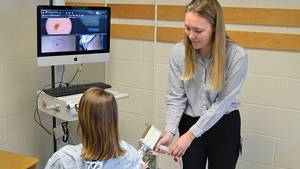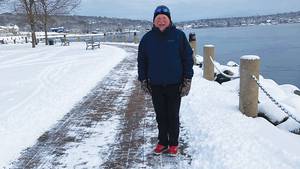Ever wonder how some essential healthcare staff get to work during the most terrible snow storms?
Thankfully the QEII has a secret weapon: the Severe Weather Assistance Team (SWAT).
Powered by the Halifax chapter of the Nova Scotia Jeep Club, the SWAT gets called in during adverse weather conditions to provide safe passage for staff, ensuring the QEII can uphold its high level of patient care.
“We're just a group of like-minded individuals, who like to get out and drive in our Jeeps,” says John Mason, president of the Jeep Club and a QEII employee.
Mason explains the idea for the Jeep Club transporting QEII staff began during the White Juan snowstorm in 2004. A member of the club had a friend, a nurse, who needed a drive to work. After the successful transport, the club then connected with the QEII, identified the health centre’s needs, and it grew from there.
They don't get called out often, but when they do it's in a real time of need.
“The determining factor is usually when the police begin calling people and buses off the roads,” says John.
While the Jeep Club does the heavy lifting — plowing through the snow to gather staff — the QEII Emergency Operations Centre (EOC) has to plan and coordinate who to pick up.
Sandra Janes is a health services director at the QEII and also sits on the EOC, which tackles staffing issues for the health centre and coordination of making sure every unit is operational.
While there is a lot of juggling, Sandra says that the strong lines of communication between departments help move the process along.
“Most clinical work areas either hear from staff who are coming in for their next shift, or they will reach out to their staff ahead of time to see what their backup plan is for getting into work when they anticipate snow will be an issue,” says Sandra. “If a number of staff indicate they are having trouble getting to work, the EOC decides to call upon the Jeep Club.”
“There is not a lot of flexibility for being down too many staff – we want to keep areas staffed to the safest level possible.”
Health service manager Sue Brander-Murtha works directly with the charge nurse to ensure each department is functional.
“It's ideal for us because in some settings, such as the ICU and other critical units, we can't function without our full quorum of nurses,” says Sue.
One of the most comforting things for Sandra and Sue is knowing their staff is being transported by safe, experienced drivers.
“It's not mandatory, but we do have a 'Jeep: 101' course that we do for all our new club members, where we teach them about tricks and tips in getting through less-than-ideal situations,” says John. “When we do our trail runs and our winter runs, we get a lot of experience riding in adverse conditions.”
“SWAT is a separate entity from the Jeep Club, but we use the Jeep Club membership as the minimum to be a member of SWAT, because we know them, we know they've done the training and we are confident in their driving abilities.”
For the Jeep Club, it's about giving back to the community and having fun.
“We're helping out the community and all our members feel good about it at the end of the day,” says John. “People look at us like we have three heads, but for us, a lot of the time that we go out in this weather, is kind of like our time to play!”








